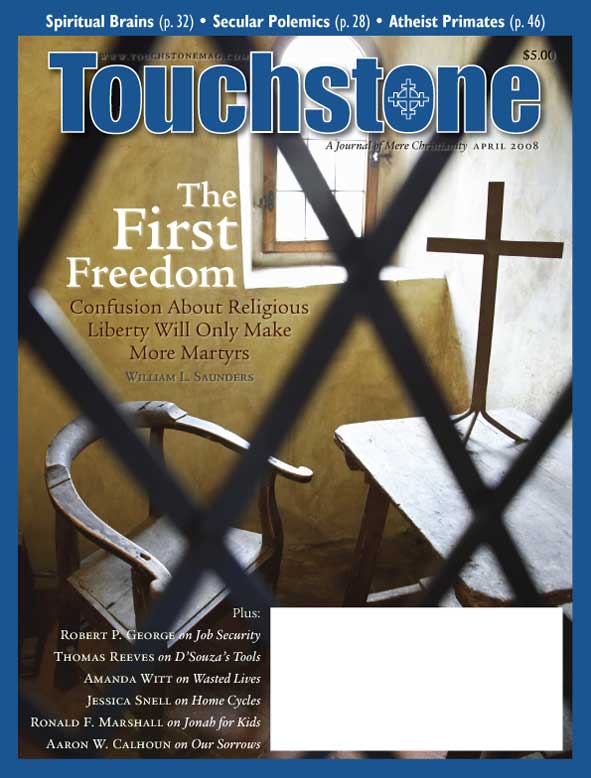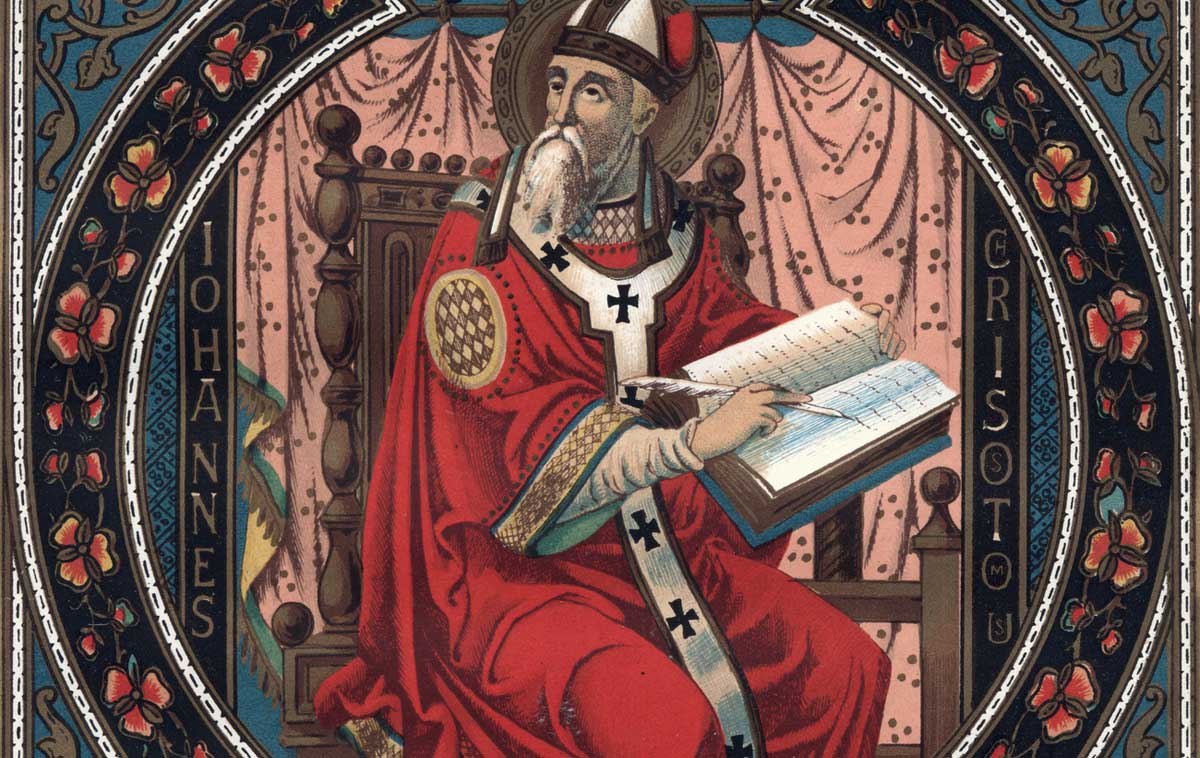Jesus Wept
Aaron W. Calhoun on Calvary’s Answer to Suffering
I write this in the aftermath of a difficult week. I am a pediatric critical care physician, and in my line of work, “difficult” typically means that someone has died. Over the past nine days, two children have died during my watch.
One had a diseased heart, his valves unable to properly direct the flow of blood, the veins in his lungs overworked by the stress. He entered the emergency room with difficulty breathing, and despite the great technological achievements that were brought to bear for his recovery, his heart gave out before he even left the examining room. The last words of his family were, “He was going to be Batman for Halloween.”
Seven days later, despite fervent prayer that things might proceed otherwise, I found myself standing over the body of a four-year-old girl. Suffering from kidney disease, she had been placed in my care after her respirations had become too labored for the general ward. Within hours, her heart was failing, her blood filled with lactic acid, the byproduct of a process that we could not identify. And soon, after forty-five minutes of chest compressions, epinephrine, and bicarbonate, she was declared dead for reasons that we still do not understand.
We said that we did all we could, and comforted the grieving families through the process of letting go of a loved one. It is never easy, this work; for to be truly present to another human being facing the ultimate things of life is only possible if you face them yourself.
A Pastoral Task
In my initiation into the medical profession, I learned that, in past days, doctors and priests shared much, indeed, were often the same person, and how their fields diverged due to scientific and technological advances. Yet I cannot help but believe that the practice of medicine remains at its core a pastoral task.
For it is not science that defines the task of a physician, although the insights of biology and chemistry have enabled us to work wonders that only fifty years ago would have seemed the stuff of fantasy. Nor is it simply the privilege of serving men and women from all walks of life, though this is indeed one of the great pleasures of the field. Medicine, like the ministry, is one of the great arenas in which human beings daily pit themselves against physical and spiritual suffering, the so-called natural evil that suffuses our world.
Many would see this evil as prime evidence of the ruthless indifference of our universe. “There is no God,” they say, “for how could God allow such suffering in those he claims to love? If he were truly real, then he would split the sky in anger, reaching into the world to alter these painful realities.” Others approach it differently. “Even if there is a God, he must be weak, for how can Good, Omnipotence, and Evil co-exist?”
And thus, to the atheist, the argument is over. There is no answer to the problem of natural evil because there is no question, just the sheer fact of waste and meaninglessness repeated over and over through the pages of cosmic history.
As Christians, we rightly respond to this type of reasoning with frustration, seeking to justify our beliefs with logic and theology, but all too often we do not understand the deep reality behind these thoughts. Seeing instead a threat to our worldview, great codices of abstract thought spring up to defend the sovereignty of God, treatises penned to defend the coexistence of the sinfulness of man, the caprice of nature, and the existence of omnipotent goodness.
Frequently these address important points, for often the atheist is responding to a straw man, a caricature of what the Christian faith actually asserts. But too often they substitute the true core of our faith with mere theism.
In an article titled “Advent’s Answer to the Problem of Evil,” the theologian Telford Work differentiates between the “Theistic” and the “Christological” answers to the problem of natural evil. Theistic answers stress God’s transcendence, his providence in creation, and his authority over nature. Appealing to philosophy, they seek to clarify the divine attributes in such a way that no contradiction can be seen between God’s goodness, his omnipotence, and his sovereignty over the world.
Christological answers deal with natural evil not with a defense of who God is, but with an exposition of what God did. They stress, not logic and argument, but a direct appeal to the power of Christ’s death and resurrection over evil.
Answers Off the Point
All too often in Christian accounts of suffering or tragedy I see repeated references to God’s plan and his sovereignty. As evidence, examine many of the responses to the Christmas 2004 tsunami as presented by David Bentley Hart in The Doors of the Sea. Although some were deeply compassionate, many primarily sought to refute the arguments of the atheist by appealing to a God of ultimate might, who creates both health and calamity, whose glory is displayed equivalently in the rage of a volcano and the calm of a sunset.
As I ponder this approach, seeing it in the light of the boy with the diseased heart, the girl with kidney disease, I cannot help but conclude that it is not so much incorrect as off the point. Although it may be logically rigorous and philosophically sound (usually much more so than the atheist polemic), in the end, those who are suffering do not wish for logic or rigor but for a response from God. And all too often we forget that God has, in fact, given that response in Christ.
We forget that the ultimate response to evil is not a theory or a doctrine, but a person. In Philippians 2:5–11, we learn that Jesus Christ, being God, did not see Godhood as something to be held onto, but rather suffered humiliation and death for us. And it is in him, the Infinite God who became man and died, bearing our suffering and sin as his own, that we see the truth.
Too often we attempt to wrest principles for living from the Word but forget that in the final analysis the Bible is there to tell us a story, the true story of a God who, seeing his creation suffer, decided that he would rather die than allow it to fall into the abyss.
God is not in heaven as we suffer, benignly looking down on our struggles, holding back his divine power for some inscrutable (although unquestionably good) purpose. No, he is here with us.
His hands, pierced with iron spikes, have felt the weight of a dying universe. His heart, impaled by the point of a spear, was broken for both the suffering we experience and the suffering we cause. The black sea of hatred, brutality, and sin that had engulfed the world was taken into the heart of the Godhead himself, only to be lost in the greater ocean of his unfailing love.
Hearts to Be Broken
It is we who, living in this age, after the Resurrection, after the Ascension of the God-Man to the right hand of the Father, remain on earth to carry this message to the poor, the broken, and the sick. We are the Body of Christ, and it is our hands that remain to be pierced, our hearts that now stand to be broken by the darkness of this world.
To paraphrase Charles Williams, if there is one law in the life of a Christian, it is this: My life for yours. The answer to the great question of natural evil is neither syllogism nor argument, it is the life of a member of the Lord’s body, a life willing to take up its cross and pour itself out completely so that others might live. It is a life of sacrifice, lived in imitation of the Master. •
Aaron W. Calhoun received his MD from Johns Hopkins University School of Medicine in 2001. He is currently an Assistant Professor of Pediatric Critical Care at the University of Louisville. He is a member of the Christian Medical and Dental Associations (www.cmda.org) and worships with his wife Jamie and son Noah at Grace Evangelical Free Church in Louisville, Kentucky.
subscription options
Order
Print/Online Subscription

Get six issues (one year) of Touchstone PLUS full online access including pdf downloads for only $39.95. That's only $3.34 per month!
Order
Online Only
Subscription

Get a one-year full-access subscription to the Touchstone online archives for only $19.95. That's only $1.66 per month!
bulk subscriptions
Order Touchstone subscriptions in bulk and save $10 per sub! Each subscription includes 6 issues of Touchstone plus full online access to touchstonemag.com—including archives, videos, and pdf downloads of recent issues for only $29.95 each! Great for churches or study groups.
Transactions will be processed on a secure server.
more from the online archives

24.6—Nov/Dec 2011
Liberty, Conscience & Autonomy
How the Culture War of the Roaring Twenties Set the Stage for Today’s Catholic & Evangelical Alliance by Barry Hankins
calling all readers
Please Donate
"There are magazines worth reading but few worth saving . . . Touchstone is just such a magazine."
—Alice von Hildebrand
"Here we do not concede one square millimeter of territory to falsehood, folly, contemporary sentimentality, or fashion. We speak the truth, and let God be our judge. . . . Touchstone is the one committedly Christian conservative journal."
—Anthony Esolen, Touchstone senior editor








